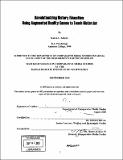| dc.contributor.advisor | Edward Barrett. | en_US |
| dc.contributor.author | Schrier, Karen L | en_US |
| dc.contributor.other | Massachusetts Institute of Technology. Dept. of Comparative Media Studies. | en_US |
| dc.date.accessioned | 2009-01-30T18:39:22Z | |
| dc.date.available | 2009-01-30T18:39:22Z | |
| dc.date.copyright | 2005 | en_US |
| dc.date.issued | 2005 | en_US |
| dc.identifier.uri | http://dspace.mit.edu/handle/1721.1/39186 | en_US |
| dc.identifier.uri | http://hdl.handle.net/1721.1/39186 | |
| dc.description | Thesis (S.M.)--Massachusetts Institute of Technology, Dept. of Comparative Media Studies, 2005. | en_US |
| dc.description | Includes bibliographical references (leaves 154-162). | en_US |
| dc.description.abstract | In an ever-changing present of multiple truths and reconfigured histories, people need to be critical thinkers. Research has suggested the potential for using augmented reality (AR) games- location-based games that use wireless handheld devices to provide virtual game information in a physical environment-as educational tools. I designed "Reliving the Revolution" as a model for using AR games to teach historic inquiry, decision-making, and critical thinking skills. "Reliving the Revolution" takes place in Lexington, MA, the site of the Battle of Lexington (American Revolution) and simulates the activities of a historian, such as evidence collection and interpretation. Participants interact with virtual historic figures and gather virtual testimonials and evidence on the Battle, each triggered by GPS to appear on the handheld devices depending on one's specific location on or around the Lexington Common. The participants collect differing evidence based on their historic role in the game (Minuteman soldier, loyalist, African American/Minuteman soldier, or British soldier) and then collaboratively evaluate who fired the first shot to start the Battle of Lexington. | en_US |
| dc.description.abstract | (cont.) I envision "Reliving the Revolution" not as a standalone educational solution, but as an activity integrated into a broader history curriculum that teaches students how to approach and evaluate complex social problems. This thesis provides a detailed rationale for each of my design choices, as well as an assessment of each choice based on the results of iterative game testing. In my analysis of the game's design, I focus specifically on four game elements: (1) collaborative, (2) role-playing, (3) storytelling or narrative elements; and (4) kinesthetic and mobility. Results of trials of the game suggest that "Reliving the Revolution" and similar AR games can enhance the learning of: (1) historical name, places, and themes; (2) historical methodology and the limits to representations of the past; and (3) alternative perspectives and challenges to "master" historical interpretations. The game motivated participants to gather, evaluate, and interpret historical information, devise hypotheses and counter-arguments, and draw informed conclusions. | en_US |
| dc.description.abstract | (cont.) My trials also suggested that AR games such as "Reliving the Revolution" can enhance learning because it can: 1. Create an authentic "practice field" for solving problems and using real-world contexts and tools. 2. Increase the potential for collaboration among participants, and enhance opportunities for reflection. 3. Enable participants to take on and express new identities through role-playing. 4. Encourage participants to explore more deeply a physical site and to consider interactions between the real and virtual worlds. | en_US |
| dc.description.statementofresponsibility | by Karen L. Schrier. | en_US |
| dc.format.extent | 290 leaves | en_US |
| dc.language.iso | eng | en_US |
| dc.publisher | Massachusetts Institute of Technology | en_US |
| dc.rights | M.I.T. theses are protected by
copyright. They may be viewed from this source for any purpose, but
reproduction or distribution in any format is prohibited without written
permission. See provided URL for inquiries about permission. | en_US |
| dc.rights.uri | http://dspace.mit.edu/handle/1721.1/39186 | en_US |
| dc.rights.uri | http://dspace.mit.edu/handle/1721.1/7582 | en_US |
| dc.subject | Comparative Media Studies. | en_US |
| dc.title | Revolutionizing history education : using augmented reality games to teach histories | en_US |
| dc.type | Thesis | en_US |
| dc.description.degree | S.M. | en_US |
| dc.contributor.department | Massachusetts Institute of Technology. Program in Comparative Media Studies/Writing | |
| dc.identifier.oclc | 64583343 | en_US |
